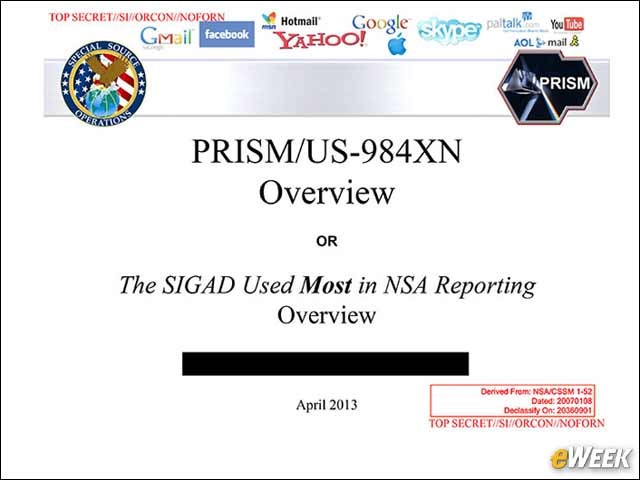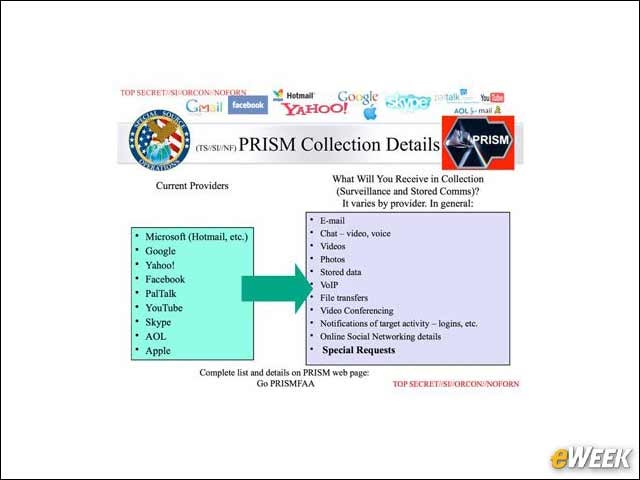eWEEK content and product recommendations are editorially independent. We may make money when you click on links to our partners. Learn More.
2Leak Exposes Extent of PRISM Surveillance Program
Reports based on leaked documents describe the PRISM program as enabling in-depth surveillance on live communications and stored information, which includes email, video and voice chat, videos, photos, voice over IP (VOIP) conversations, file transfers, log-in notifications and social networking details. Source: The Washington Post
3Big Brother Is Watching
4Major Organizations Deny Involvement
Microsoft, Google and Apple have all denied involvement in the PRISM program, with Apple claiming they do not provide any government agency with direct access to their servers, and any government agency requesting customer data must get a court order. A Facebook statement said when the company is asked for data or information about specific individuals, it provides information only to the extent required by law. Source: The Washington Post
5Timeline of Tapping
This graph shows the annual cost of the program—$20 million per year, as well as the dates in which PRISM collection began for each provider. As noted, many of the companies identified in this document have emphatically denied any involvement in, or knowledge of, this program. A Microsoft spokesperson wrote that if the government has a broader voluntary national security program to gather customer data, the company doesn’t participate in it. Source: The Washington Post
6Clapper Calls Out Alleged Inaccuracies
U.S. Director of National Intelligence James Clapper said the unauthorized disclosure of information about this “important and entirely legal program” was reprehensible and risked important protections for the security of Americans. “The Guardian and The Washington Post articles refer to collection of communications pursuant to Section 702 of the Foreign Intelligence Surveillance Act (FISA). They contain numerous inaccuracies,” his statement read, in part.
7U.S. Senators Say Everything is Fine—and Legal
Senate Intelligence Committee Chairman Dianne Feinstein (D-Calif.) and Vice Chairman Saxby Chambliss (R-Ga.) released a joint statement defending the analysis of the Verizon phone call data. In 2012 the pair issued a statement expressing pleasure that the FISA act had been reauthorized by the Senate, which it said included “strong privacy protections”.
8A Joint Statement Attempts to Clarify
Saxby and Feinstein’s statement said FISA does not allow the government to listen in on the content of a phone call, and claimed the intelligence that has so far been collected has helped protect the nation. “The threat from terrorism remains very real and these lawful intelligence activities must continue, with the careful oversight of the executive, legislative and judicial branches of government,” the statement read.
9Electronic Frontier Foundation Expresses Outrage
Many privacy advocacy groups were outraged by the details of the reports, with the EFF calling for a national dialogue about citizens’ rights in the digital age and an end to the NSA’s “unconstitutional” domestic surveillance program. “This type of untargeted, wholly domestic surveillance is exactly what EFF, and others, have been suing about for years,” Cindy Cohen and Mark Rumold of the EFF wrote in a blog post.
10President Obama Defends Phone Call Surveillance Programs
President Barack Obama on June 7 tells Americans “nobody is listening to your phone calls” and that the Verizon call data analysis program includes the numbers and other data about the calls but not the names associated with the numbers or the content of the call. He also noted that Congress was aware of the NSA phone call analysis program.
11ACLU Voices Concerns
“The stories published over the last two days make clear that the NSA—part of the military—now has direct access to every corner of Americans’ digital lives,” ACLU Deputy Legal Director Jameel Jaffer, said in a statement. “Unchecked government surveillance presents a grave threat to democratic freedoms. These revelations are a reminder that Congress has given the executive branch far too much power to invade individual privacy, that existing civil liberties safeguards are grossly inadequate, and that powers exercised entirely in secret, without public accountability of any kind, will certainly be abused.”
12Al Gore Uses Social Media to Blast the Program
Former Vice President Al Gore issued a strongly worded response to the programs through a typically 21st century platform—Twitter: “In (this) digital era, privacy must be a priority. Is it just me, or is secret blanket surveillance obscenely outrageous?” Gore, a champion of climate change awareness has more than 2.6 million Twitter followers.











